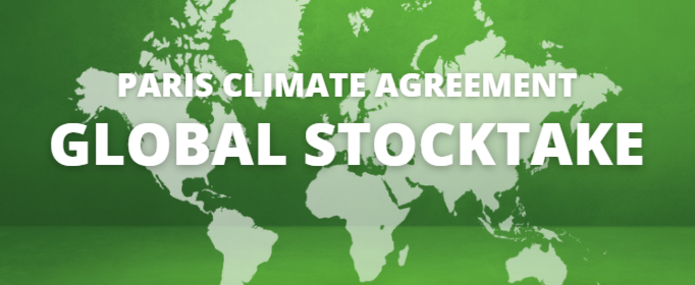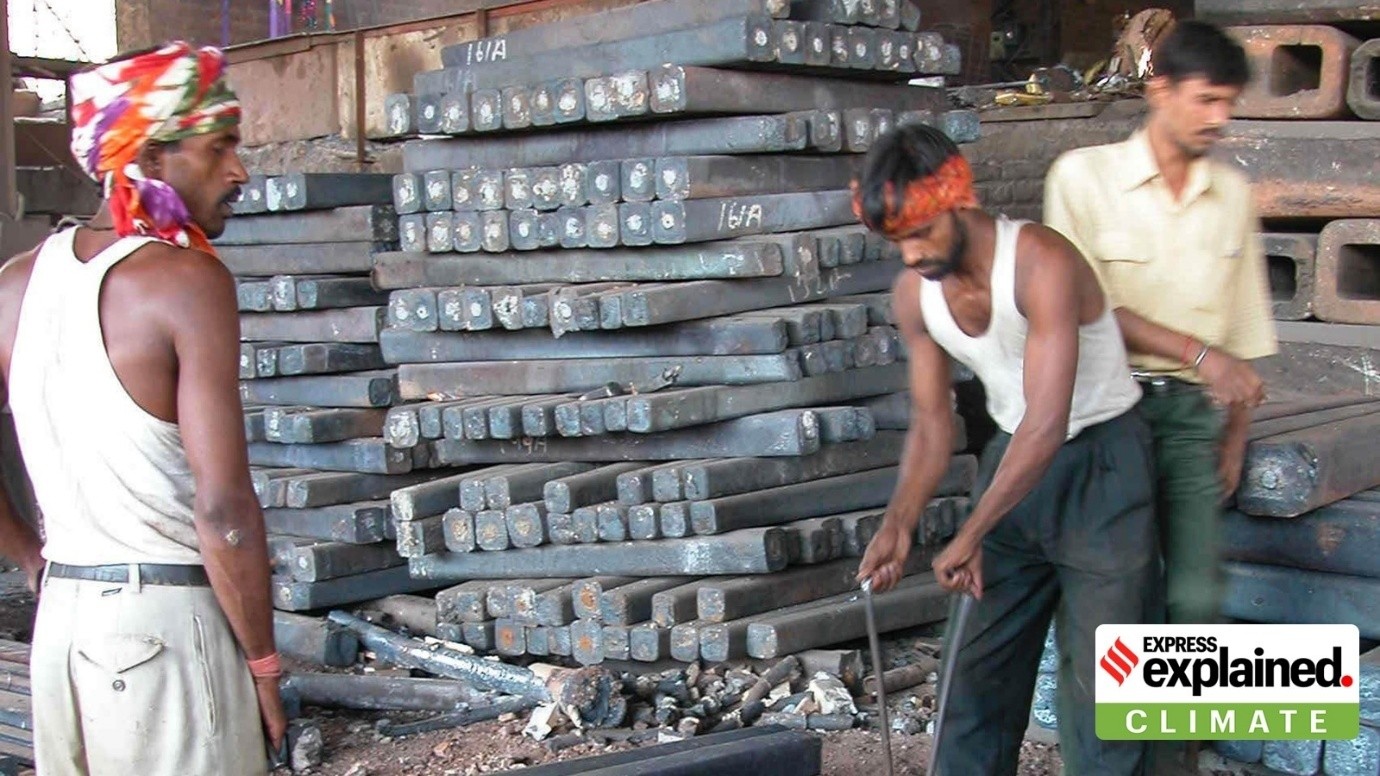Description

Disclaimer: Copyright infringement not intended.
Context
- The world is “not on track” to meet the long-term goal of limiting global temperatures to 2 degrees Celsius, warns the first global stocktake technical synthesis report released by the United Nations Framework Convention on Climate Change (UNFCCC).
What Is the Global Stocktake and Why Is It Important?
- The Paris Agreement’s Global Stocktake process is designed to assess the global response to the climate crisis every five years, with the first-ever Stocktake slated to conclude during this year's UN climate conference (COP28) in December.
- It evaluates the world's progress on slashing greenhouse gas emissions, building resilience to climate impacts, and securing finance and support to address the climate crisis.
- The first Global Stocktake marks the most extensive assessment of global action on climate change to date, distilling over 1,600 documents from diverse sources and drawing from consultations not only with scientists and governments but also cities, businesses, farmers, Indigenous people, civil society and others.
- Its key findings, released in a Synthesis Report in September, lay bare just how far the world is from achieving the Paris Agreement’s goals and emphasize the closing window of opportunity.
- It underscores that if we don’t take stronger action before the second Global Stocktake in 2028, we may witness the devastating reality of global temperatures soaring beyond 1.5 degrees C.
- But the report also illuminates a path forward that governments will need to follow to combat the climate crisis.
- It pinpoints key areas where immediate action must happen and provides a roadmap for the systems transformations needed to dramatically reduce emissions, build resilience and safeguard our future.
- By the end of COP28, countries must agree on how they will leverage the Stocktake’s findings to keep the global goal of limiting temperature rise to 1.5 degrees C alive and address the impacts of climate change.
Which Aspects of Climate Action Does the Global Stocktake Assess?
- At COP24 in Katowice, Poland in 2018, countries agreed that the Global Stocktake would address climate progress in three key areas:
- Mitigation: Evaluating global efforts to reduce greenhouse gas emissions and keep global temperature rise below 2 degrees C (3.6 degrees F) and ideally 1.5 degrees C (2.7 degrees F), and identifying opportunities for additional emissions cuts.
- Adaptation: Measuring progress in countries’ abilities to enhance their resilience and reduce vulnerability to climate impacts.
- Means of implementation, including finance, technology transfer and capacity building: Assessing progress on aligning financial flows with emissions-reduction goals and climate-resilient development, and providing support to developing nations to address the climate crisis.
- Additionally, the Global Stocktake is meant to address loss and damage, helping assess the actions and support needed to respond to climate impacts that go beyond what communities and ecosystems can adapt to. It also considers the unintended social and economic consequences that may arise from climate action and implementation, known as response measures. In addition, the Global Stocktake is intended to emphasize the importance of promoting equity and leveraging the best available science to inform strategies for tackling the climate crisis.
What Does the Global Stocktake Process Look Like?
- The Global Stocktake is meant to be a participatory process that is open, inclusive and transparent, as countries agreed at COP24.
- Taking place over the course of two years, the Global Stocktake begins with data collection and technical assessment phases and culminates with a high-level political phase.
- This cycle’s final political phase will take place at COP28 in Dubai in December 2023.
What were the key findings from the first Global Stocktake?
- The Global Stocktake’s technical phase ended with an overarching Synthesis Report, released in September 2023, which summarizes key findings that will inform the Stocktake’s political outcomes at COP28. While the report highlights progress that has been made since the Paris Agreement — global temperatures are now expected to rise by 2.4-2.6 degrees C (4.3-4.7 degrees F) by the end of the century, compared to 3.7-4.8 degrees C (6.7-8.6 degrees F) in 2010 — it also makes clear that greater ambition and urgency are needed on all fronts to combat the climate crisis.
- The Synthesis Report underscores a persistent “emissions gap,” noting that current climate commitments are not in line with pathways needed to limit global warming to 1.5 degrees C. But it also charts a path forward, emphasizing the urgent need for system-wide transformations that can slash emissions and ensure a climate-resilient future.
- Most pressing is the need to phase out unabated fossil fuels, scale renewable energy, significantly shift transport and industry, and reduce non-CO2 emissions such as methane. Preserving nature, ending deforestation and embracing sustainable agriculture are also key to enhance resilience and deliver emissions cuts.
- Critically, the Stocktake report puts people at the heart of these transitions and underscores the imperative for resilience and equity in all transformative efforts. It stresses the urgency of increasing adaptation support and addressing loss and damage, particularly for vulnerable communities. It also emphasizes that plans and commitments for adaptation action and support have been poorly implemented, are unevenly distributed and have progressed only incrementally.
- To address these issues, it underscores the need to reorient trillions of dollars in global finance and mobilize significant resources in support of a zero-carbon, climate-resilient and equitable future. The report is clear that just transitions, equity, and tailoring approaches to local contexts will be key to ambitious and robust outcomes that advance sustainable development and efforts to eradicate poverty.
What will happen at COP28?
- The third and final phase of the Global Stocktake, consideration of outputs, will take place at COP28 in Dubai. This stage is critical, as it will determine how countries respond politically to the gaps and opportunities identified in the technical phase.
- During Phase 3, country delegates will discuss the Stocktake’s technical findings, identify opportunities and challenges, and assess measures and best practices for climate action and international cooperation.
- Following these discussions, countries will collectively produce a summary of key political messages, which can then be referenced in COP28’s final decision. This final decision would formalize the guidance and commitments all countries adopt in developing their future climate actions and support.
READ:
https://www.iasgyan.in/daily-current-affairs/indias-updated-nationally-determined
https://www.iasgyan.in/daily-current-affairs/nationally-determined-contributions
https://www.iasgyan.in/daily-current-affairs/climate-finance
https://www.iasgyan.in/daily-current-affairs/climate-finance
https://www.iasgyan.in/daily-current-affairs/ipcc-ar6-synthesis-report
https://www.iasgyan.in/daily-current-affairs/ipccs-sixth-assessment-report
https://iasgyan.in/blogs/all-about-intergovernmental-panel-on-climate-changeipcc
|
PRACTICE QUESTION
Q. What Is the Global Stocktake and why is it important? Which aspects of Climate Action does the Global Stocktake assess? Explain.
|
https://www.downtoearth.org.in/blog/climate-change/world-not-on-track-to-meet-long-term-climate-targets-shows-largest-ever-un-assessment-91667











